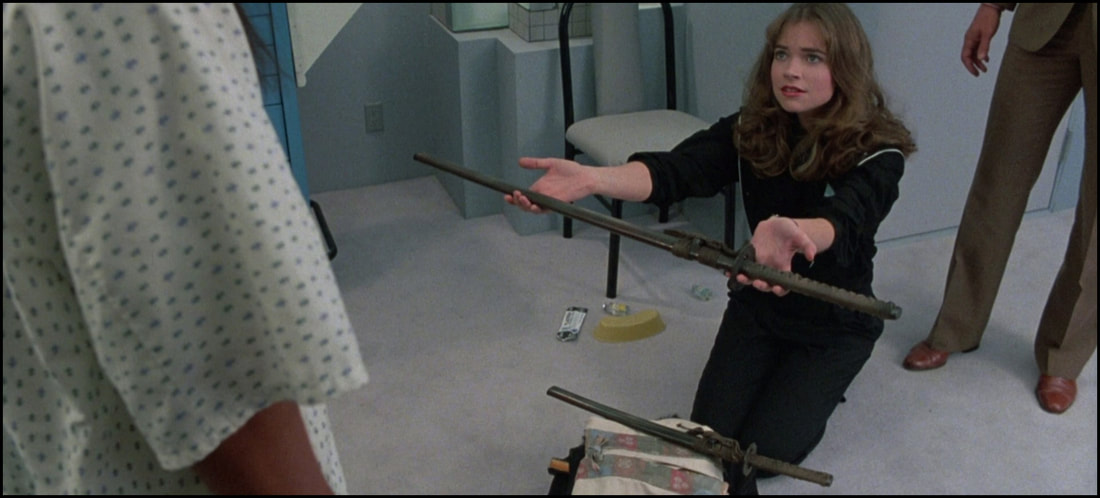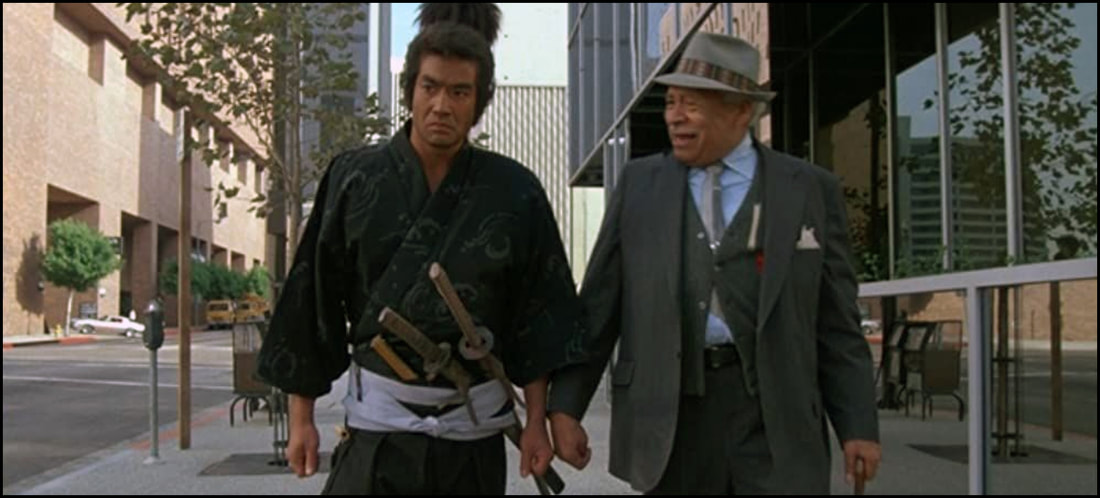Indeed, Universal Pictures and Glen A. Larson launched an entire franchise surrounding the idea in 1979 when they delivered a contemporary version of Buck Rogers In The 25th Century first to the silver screen and then to the small one. In it, Captain William ‘Buck’ Rogers experienced a stellar phenomenon that put him to sleep for much more than a nap, and he awoke centuries after his initial launch from Earth. A few years after the series, Universal and director Fred Schepisi even took another swing at the idea, this time with a bit more dramatic panache: Iceman (1984) saw a Neanderthal man frozen in ice thawed, revived, and studied by a team of scientists on an arctic mission. Trust me when I say that – while there have been many, many more – what really matters most is that storytellers rarely let a good idea go to waste, so they’ve found countless variations on it in order see that – like its fateful sleepers – it never dies.
In 1984, Albert Band International Productions, Inc. and Empire Pictures teamed up for another go at tackling the cryogenic traveler when they delivered Ghost Warrior (aka Swordkill) to theaters. According to IMDB.com, the picture enjoyed its theatrical debut May 15 at the Cannes Film Market before securing release in countries around the world. Directed by J. Larry Carroll from a script by Tim Curnen, the SciFi/Drama starred Hiroshi Fujioka as Yoshimitsu, a samurai warrior who by way of a frozen slumber finds himself displaced a few centuries only to wake up in 1980’s America where he’ll sadly learn that crime and punishment are still in fashion.
(NOTE: The following review will contain minor spoilers necessary solely for the discussion of plot and/or characters. If you’re the type of reader who prefers a review entirely spoiler-free, then I’d encourage you to skip down to the last few paragraphs for the final assessment. If, however, you’re accepting of a few modest hints at ‘things to come,’ then read on …)
From the film’s IMDB.com citation:
“A deep-frozen 400-year-old samurai is shipped to Los Angeles, where he comes back to life. Dazed and confused, he goes on a rampage. Can the female scientist and her colleague who revived him stop him before it’s too late?”
So you can imagine my glee at discovering Ghost Warrior, an 80’s flick – produced by genre legend Charles Band, no less – that brought Fantasy and Samurai together in a single 80+ minute feature? Somehow this one had escaped my research for so many years, and it’s likely owed to the project’s unevenness in, perhaps, every measurable regard. With a title as bland as Ghost Warrior, there’s no indication as to what you’re getting in exchange for a rental much less an outright purchase, and the lack of any marquee participants (leading man Fujioka isn’t a known commodity in the U.S., and he’s surrounded by second- and third-tier talent from start-to-finish) probably anchored the property to obscurity. While I do think that’s a crying shame – as films go, this one isn’t all that bad – and perhaps this Kino Lorber release will deliver its own form of justice to this fallen warrior.
As tends to happen in B-Movie territory, most problems evolve from an underbaked script, and Curnen’s shoulders just weren’t mighty enough to put this samurai on the proper path.
Yoshi is given an entirely perfunctory set-up: nameless villains have apparently absconded with the love of his life, and he rides out to both stop and confront them in the process. Though he wins his fair lady’s release, he’s quickly double-crossed when the attacker whose life he just spared rises up and hurls a knife into the woman’s gut, killing her. Yoshi’s vengeance is swift, only now he suffers an arrow to the chest, forcing him to plunge off a cliff and into the freezing waters below. A few centuries later, cave explorers happen across the samurai’s frozen body; and – without so much as a passing explanation – the action suddenly shifts to California, where Dr. Alan Richards (played by John Calvin) headlines a team of crack physicians with the skills, equipment, and know-how to bring Yoshi’s frozen body back to life.
At this point, Curnen’s script settles into the traditional ‘fish out of water’ formula, gauging Yoshi’s responses to technology vastly greater than anything of his day. Richards brings in what we’re led to believe is a crack specialist on Japanese culture – Chris Welles (the comely Janet Julian) – but even the character’s narration as written and delivered by the actress admits her singular weakness is that she isn’t very good at speaking Japanese. (?!?!) That and the fact that her only demonstrated understanding of Japanese society seems to be tied to a local Japanese antiques shop truly stretches the bounds of believability nearly too far for the film to effectively ever recover.
Given the single fact that there’s literally no one around to cross swords with in the big finish, this Ghost Warrior never had the ghost of a chance to truly rise to the occasion and maybe – just maybe – have been a contender.
Ghost Warrior (1984) was produced by Albert Band International Productions, Inc.; Empire Pictures; Harkham Productions; and Swordkill Productions. DVD distribution (for this particular release) is being coordinated by the good people at Kino Lorber. As for the technical specifications? While I’m no trained video expert, I thought the sights and sounds were exceptionally well delivered; there are a few sequences that appeared a bit soft, but they were not in any way a distraction to the experience. Lastly, if you’re looking for special features? The disc boasts an interview with Special Makeup Effects Artist Robert Short, the theatrical trailer, and an audio commentary track by Film Historians Brandon Bentley and Mike Leeder. I’ve listened to the commentary, and – sigh – while I found it occasionally interesting (both hosts clearly know their stuff) the two spend far too much time talking about how they would’ve altered story elements they found ineffective to make for a more inclusive narrative. Their constant Monday morning quarterbacking – along with the fact that one of their microphones was apparently stuck on reverb or something – makes the track hard to recommend.
Strongly recommended.
Ghost Warrior (1984) isn’t so much flawed as others might suggest; rather, Tim Curnen’s script very early establishes itself as trying to parallel Yoshi’s past and present both textually and visually, so it descends quickly into an entirely predictable affair. Fujioka’s earnestness isn’t enough to carry the picture on its own, and far too many stock performances (i.e. token love interest, urban tough guys, hardened city cops, and evil scientists) give the film enough weight to sink it in any body of water … and that itself already happens twice in the picture. Still, as B-Movies go, it’s hard not to root for the temporal underdog, and that’s what props up an otherwise forgettable affair.
In the interests of fairness, I’m pleased to disclose that the fine folks at Kino Lorber provided me with a complimentary Blu-ray of Ghost Warrior (1984) by request for the expressed purposes of completing this review; and their contribution to me in no way, shape, or form influenced my opinion of it.
-- EZ




 RSS Feed
RSS Feed